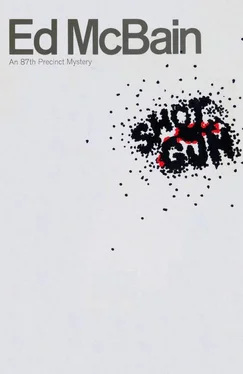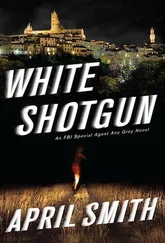“Introduced me to her brother once,” Pimm said. “Nice fellow, too. Met them coming out of the apartment one day.”
“Her brother?” Carella said. He had just remembered with a chilling suddenness that Gloria Leyden had described her daughter-in-law as an only child. She was an only child herself, you know, but she had these thousands of cousins scattered all over the countryside.
“That’s right, her brother,” Pimm said.
“What’d he look like?”
“Tall fellow, very good-looking. Blue eyes, dark hair. Nice fellow.”
“What was his name? Did she say?”
“Harry, I think.”
“No,” Jeanine said.
“Wasn’t it Harry?” Pimm asked.
“Wally,” Jeanine said. “It was Wally.”
So now the closet door was open, and as usual there was a skeleton hanging in it. The skeleton was a familiar one, it bored Carella and Kling to tears. Oh, how they hoped for an original slaying once in a while, a well-conceived murder instead of these sloppy run-of-the-mill crimes of passion that were constantly being dumped into their laps. Oh, how they longed for a killer who would knock off somebody with a rare untraceable poison. Oh, how they wished they might find a body in a locked windowless room. Oh, how they wanted somebody to scheme and plot for months on end and then commit the perfect homicide that everyone would think was suicide or something. Instead, what did they get? They got Andrew Leyden, cuckold of the month, working his little heart out in California and environs while Rosie dallied with her lover. They got Walter Damascus, womanizer supreme, with his Mandy downtown and his Rosie uptown, who for whatever twisted reasons of his own decided he would knock off both his uptown mistress and her husband. Walter Damascus, who had committed murder crudely and brutally and then oh so cleverly rigged the second murder to look like suicide — a clumsy ruse that would be detected the moment any apprentice cop found the ejected shotgun shell. That was what they got. They got a crazy bastard who made love to Mandy downtown in his pigsty apartment, asked her to drive him uptown to his “poker game,” blasted Rosie and Andy, and then went into the john to shave with the dead man’s razor.
They never got the interesting cases.
Meyer and Hawes got all the interesting cases.
The interesting thing about the Margie Ryder case was that there seemed to be no motive. The other interesting thing was that it was very neat for a stabbing. When somebody starts stabbing another person, there’s a certain je ne sais quoi that takes over, a rhythm that’s established, a compulsive need to plunge the blade again and again, so it shouldn’t be a total loss. It is not uncommon in stabbings to find a corpse with anywhere from a dozen to a hundred wounds, that’s the thing about stabbings.
Margie Ryder was stabbed only once.
Once is enough, you may say, because after all if you’ve seen one kitchen knife being plunged into your chest, you’ve seen them all. But it was this very lack of multiple wounds that ran contrary to what the police had come to expect in all the dreary little knifings they encountered every day of the week.
Nothing had been stolen from the Ryder apartment, nor had the woman been molested. Discounting burglary then, and discounting rape, the bartender Jim Martin seemed to have a point when he suggested that the killer had to be somebody Margie knew. Well, most of the people she’d known had been at a party thrown by the guitarist Luis-Josafat Garzon, and she had left that party alone, and had then proceeded to Perry’s Bar & Grille on DeBeck Avenue where, according to Martin’s volunteered information, she had been in conversation half the night with a stranger. That stranger had returned later to ask her name, and then might (oh boy, what a big might ) have remembered it, and gone to her apartment, and been let in by Margie, and had stabbed her. Why had he forgotten her name to begin with? And what caused him to remember it again? And why had she let him in at four in the morning? Interesting, right? Meyer and Hawes got all the interesting ones.
But the most interesting thing about it was the lack of motivation. It almost seemed — and this was very puzzling — it almost seemed as if the man, the stranger become acquaintance, had gone there specifically to kill her. There were no signs of a struggle, there was no torn clothing or toppled furniture, no indication that there had been a violent argument, nothing even in the stabbing itself to indicate the actions of a man gone berserk, a man unable to control the terrible destructive power of a plunging blade. Everything was neat and simple, Margie in basic black and pearls, the knife sticking out of her chest, the single stab wound.
Neat.
Simple.
Interesting.
It stank.
On Monday afternoon, everything almost cracked wide open.
The bank teller called at 4:00 P.M. Steve Carella took the call. The teller explained that he had first called Police Headquarters to ask who was handling the Leyden case he’d been reading so much about in the newspapers. Headquarters had informed him that Detectives Carella and Kling of the 87th Precinct were handling the case, and then had belatedly asked the teller what his name was, and he had said Derek Heller, and then had given his address and telephone number at their request, and had asked whether he might talk directly to either of the two detectives handling the case. The man at Headquarters had grunted and grumbled and then reluctantly told Heller to call Frederick 7-8024, which he was doing now.
“Are you Detective Carella?” he asked.
“I’m Detective Carella.”
“How do you do? Mr. Carella, I think I have some information that might help you.”
“Regarding the Leyden case?”
“Yes, sir, regarding that case,” Heller said. “I’ve read an awful lot about it in the newspapers, which is why I’m calling.”
“Yes, Mr. Heller?”
“I’m the head teller at Commerce of America. We’ve got seven branches in the city, including one uptown on Ainsley Avenue, which is in your precinct.”
“Yes, Mr. Heller?”
“I work at the branch on Aley and Harris, all the way downtown here.”
“Yes, Mr. Heller?”
“I’ll have to give you this in sequence because it only came to my attention through a coincidental series of events.”
“Take your time, Mr. Heller.”
“Well, we close at three o’clock, as you know, and one of our tellers was having some difficulty proving his drawer. He was a dollar and thirty cents short, nothing to get terribly upset about, but he’s a new teller, and well, these things happen. In any event, he asked my assistance, and we began going through the drawer — the cash, the checks, all of it. That was how I happened to notice this one check. Mind you, I wasn’t looking for it. I was looking for that dollar-thirty discrepancy.”
“Yes, go on, Mr. Heller.”
“The check I’m talking about was made out to cash.”
“For how much?”
“Two hundred dollars, and drawn on our bank. That is to say, the checking account is one of ours.”
“Yes, Mr. Heller?”
“It is, in fact, one of our regular checking accounts, as opposed to our special checking accounts. With the special accounts, as you may know, there is a small charge for each check written. Our regular accounts, on the other hand—”
“Well, what about this particular check, Mr. Heller?”
“It was drawn to the account of Rose and Andrew Leyden of 561 South Engels Street in Isola.”
“Well, why do you find that unusual, Mr. Heller?”
“I don’t. The check is dated October sixteenth, and I know that Mr. Leyden wasn’t killed until October twenty-eighth, so there’s nothing unusual about it coming in to be cashed at this time. I’m talking about the endorsement. That’s what’s unusual.”
Читать дальше












